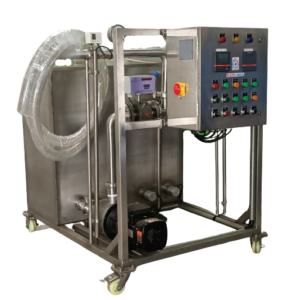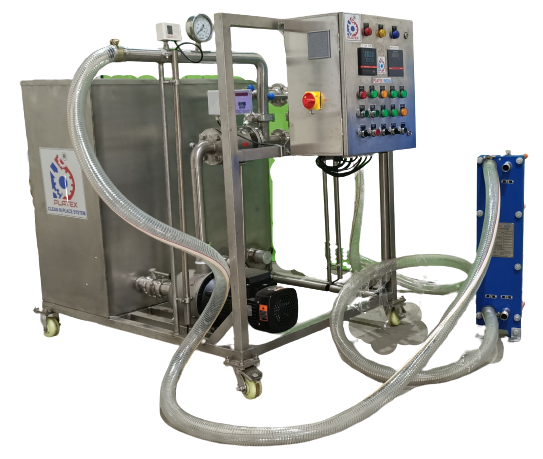CIP System
What is CIP system?
- CIP System:
Cleaning in Place or On-line Cleaning System is know for cleaning of product contact surface of vessel, heat exchanger, piping equipment without dismantling from line. - CIP started as a manual practice involving a balance tank, centrifugal pump, and connection to the system being cleaned.
- The benefits to industries by using CIP is that the cleaning is faster, less labor-intensive and more repeatable, and poses less of a chemical exposure risk.
- CIP cleaning, referred as Clean-In-Place System, is a procedure of cleaning interior product contact surfaces such as process pipes, vessels and equipment, without dismantling.
- In contrast, Cleaning-Out-of-Place (COP) is a method used when parts cannot be cleaned-in-place and must be dismantling from the process.
- Whether CIP cleaning or cleaning-out-of-place, to achieve a sanitary clean, the basic cleaning principles of
- TACT—Time, Action, Chemical and Temperature
- Must be understood.
Why Platex®India for CIP System??
- PLATEX® has designed Trolley based mobile cleaning equipment and customized to sizes from 100 to 1000LTR.
- PLATEX® CIP system is automated in a way where in built-in hater, pressure transmitters, Flow meter, Temperature sensors which makes sure 100% cleaning & efficient working.
- PLATEX® CIP units can be used for many process equipment like Heat Exchangers, Vessels, Reactors etc. The time-taking work of opening heat exchangers can be avoided.
- Benefit to industries are cleaning is faster, less labor-intensive and more repeatable also less chemical exposure risk.
- Platex® supplies a wide range of cleaning agents suitable for removing most of these troublesome deposits and restoring performance to optimal levels.
Types of CIP Systems
- Manual
- Semi-Automatic
- Automatic
Models:
- PLATENANO : 100LTR
- PLATEMICRO : 200LTR
- PLATEMINI : 400LTR
- PLATENORM : 600LTR
- PLATELARG : 800LTR
Depending on soil load and process geometry, the CIP design principle is one of the following:
- Deliver highly turbulent, high flow-rate solution to effect good cleaning (applies to pipe circuits and filled equipment).
- Deliver solution as a low-energy spray to fully wet the surface (applies to lightly soiled vessels where a static spray ball may be used).
- Deliver a high energy impinging spray (applies to highly soiled or large diameter vessels where a dynamic spray device may be used).
- Elevated temperature and chemical detergents are often employed to enhance cleaning effectiveness.
Principle of operation of Clean in Place System is basically related to the maintenance of any process equipment.
Question asked by process owner is “How do we identify need of cleaning of Process Equipment?
Generally the answer is
- Pressure drop is increased
- Temperature Profiles are not achieving (Inlet and Outlet temperature are not achieving)
Clean In Place system (CIP) works on the principle of pressure drop.
Platex®India CIP System has designed to set Inlet and outlet pressure or required pressure drop on control panel, which will give benefit of ensuring 100% cleaning of the equipment.
- Isolate the process equipment to be cleaned (Heat Exchanger, Reactor, etc.) to be cleaned
- Connect hose pipe to respective Heat Exchanger/ Reactor/ Process Vessels/etc.
- Mix CIP Chemical and Water in the tank, Open Bypass valves
- Check power supply and Start the Control Panel
- Set temperature for cleaning solution as per Platex®India Guidelines and application
- Start Electrical Heater (Individual Push up Button on Panel)
- Start Pump for bypass circulation
- Close Bypass Valves and open circulation vales after hooter noise
- Set pressure drop to be achieved*
- Start the pump for forced circulation through the process equipment and wait for hooter sound. (Hooter will give a signal once set pressure drop is achieved)
- Change the flow to reverse cleaning mode for ensuring both inlet and outlet cleaning thoroughly for 15-30minutes as per Platex®India guidelines.
- Drain the mixture and collect all the scaled particles in the filter mounted at bottom
- Fill the tank with plain water and set 50Deg. C Temperature in the panel and circulate in the process equipment for 15-30minutes for sanitization of PHE and ensuring removal of all the chemical residue.
- Dismantle the system from the process equipment and drain the water, make sure the system is drained thoroughly and clean the strainers.
- Do not OFF the Electrical Heater because CIP solution is in re-circulation Mode so any drop in temperature of solution will maintained by electrical heater. So, it will not only maintain the temp. but also avoid the overshoot of temperature.
-
- Manual
- Semi-Automatic
- Automatic
- PLATENANO : 100LTR
- PLATEMICRO : 200LTR
- PLATEMINI : 400LTR
- PLATENORM : 600LTR
- PLATELARG : 800LTR

Depending on soil load and process geometry, the CIP design principle is one of the following:
- Deliver highly turbulent, high flow-rate solution to effect good cleaning (applies to pipe circuits and filled equipment).
- Deliver solution as a low-energy spray to fully wet the surface (applies to lightly soiled vessels where a static spray ball may be used).
- Deliver a high energy impinging spray (applies to highly soiled or large diameter vessels where a dynamic spray device may be used).
- Elevated temperature and chemical detergents are often employed to enhance cleaning effectiveness.
Principle of operation of Clean in Place System is basically related to the maintenance of any process equipment.
Question asked by process owner is “How do we identify need of cleaning of Process Equipment?
Generally the answer is
- Pressure drop is increased
- Temperature Profiles are not achieving (Inlet and Outlet temperature are not achieving)
Clean In Place system (CIP) works on the principle of pressure drop.
Platex®India CIP System has designed to set Inlet and outlet pressure or required pressure drop on control panel, which will give benefit of ensuring 100% cleaning of the equipment.
- Isolate the process equipment to be cleaned (Heat Exchanger, Reactor, etc.) to be cleaned
- Connect hose pipe to respective Heat Exchanger/ Reactor/ Process Vessels/etc.
- Mix CIP Chemical and Water in the tank, Open Bypass valves
- Check power supply and Start the Control Panel
- Set temperature for cleaning solution as per Platex®India Guidelines and application
- Start Electrical Heater (Individual Push up Button on Panel)
- Start Pump for bypass circulation
- Close Bypass Valves and open circulation vales after hooter noise
- Set pressure drop to be achieved*
- Start the pump for forced circulation through the process equipment and wait for hooter sound. (Hooter will give a signal once set pressure drop is achieved)
- Change the flow to reverse cleaning mode for ensuring both inlet and outlet cleaning thoroughly for 15-30minutes as per Platex®India guidelines.
- Drain the mixture and collect all the scaled particles in the filter mounted at bottom
- Fill the tank with plain water and set 50Deg. C Temperature in the panel and circulate in the process equipment for 15-30minutes for sanitization of PHE and ensuring removal of all the chemical residue.
- Dismantle the system from the process equipment and drain the water, make sure the system is drained thoroughly and clean the strainers.
- Do not OFF the Electrical Heater because CIP solution is in recirculation Mode so any drop in temperature of solution will maintained by electrical heater. So, it will not only maintain the temp. but also avoid the overshoot of temperature.
Old vs New Practice Comparison
Manual Cleaning of Heat Exchanger is outdated technology…
USE CIP Instead and save on DOWN TIME, improve Productivity.
- OPENING of Heat Exchanger NOT Required
- No Gasket Damage
- No Spares Required
- No Leakage Problem
- No Manpower Require
- Easy to Fit
2. Trolley Mounted System (Mobile)
3. Multiple Heat Exchangers can be cleaned
4. Less operating cost
5. Less cleaning times
6. Semi-Automatic and Fully Automatic
7. Manual System requires only One Operator
Return on investment?
Determining the right investment in an appropriate CIP system also greatly depends upon budget.
More tanks designed into a system means more upfront capital cost, but it also increases production capacity.
ROI on a CIP system often takes just one or two years.
Some of our customers have production hours that run into tens of thousands of rupees.
Saving them 15 minutes of cleaning time each week can create tremendous positive results.
Technical information
Process Liquid: Chemical Cleaning Agent
Power Supply: 3 Phase / 380-415VAC / 50Hz
Application: Cleaning in place of Heat Exchangers
Tank & Trolleys:
- Material of construction: AISI 304
- Tank Capacity : 100, 200, 400, 600, 800,1000 LTRS
- Pump
- Type: Centrifugal
- Capacity: 6m3/hr to 50m3/hr
- Motor KW 2 to 5.5
- Wetted parts material SS316
Hoses:
- Hose Type Chemical hoses Inner layer black UPE with outer Green smooth layer EPDM
- Hose lengths/QTY: 4 meters/2Pcs
- End connection: SMS Union
Valves:
- Material AISI 304
- Type Butterfly Valves Manual Operation
Heater:
- Type: Immersion heater kW 12 kW Each
- Number of heater’s one / Two
Control Panel: Pump & Heater Control Panel
Cleaning Solution for CIP System
De-scaling solutions plays most important role in cleaning any type of process equipment, Platex®India being an expert in servicing of process equipment’s designed chemicals which are highly efficient cleaning agents, also takes care of the material of construction of the equipment.
To identify the exact cleaning agent suitable for process equipment, Platex®India has developed a test kit which can be used directly by user to identify suitable chemical. The test kit contains following chemicals.


